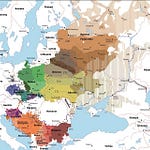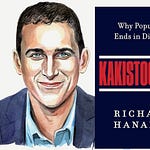On this episode of Unsupervised Learning, Razib talks to Bo Winegard and Noah Carl, the editors behind the online publication Aporia Magazine, founded in 2022. Winegard and Carl are both former academics. Winegard has a social psychology Ph.D. from Florida State University, and was an assistant professor at Marietta College. He was an editor at Quillette before moving to Aporia. Carl earned his Ph.D. in sociology from Oxford University. He was a research fellow at St. Edmund’s College, Cambridge, before becoming a contributor to The Daily Skeptic and UnHerd, and a managing editor at Aporia.
First, Razib asks Winegard and Carl about their respective cancellations, and the recent attacks on Aporia from the British media in particular. Winegard observes that many of the criticisms were muddled, as journalists struggled to get basic facts straight about who did what, as well as mixing up present associations among various editors with past ones. The two also address the change in the culture over the last few years, as cancellations seem to have lost some of their bite. Then Razib asks Winegard about the perception that Aporia is fixated on the third-rail of American culture: race and IQ, and its relevance to social policy and politics. Winegard talks about how he has long since said everything he has to say on the topic, but he still finds that the public conversation fails to address the possibility of cognitive differences between populations, and so keeps finding himself wading back in, to fill a gap in the discourse. Razib also asks the editors about their view of “cold winters theory,” which attempts to explain the higher IQs of temperate zone populations versus tropical ones.
Then they discuss the disappointments of the MAGA movement, and its appeal to populist emotion. Winegard had hoped that despite its inchoate nature, it might have been able to pare back the radical excesses of the progressive cultural changes of the 2010’s, but now he worries that overreach may up the chances that woke policies make a comeback with the inevitable political backlash in the next few years. Winegard also addresses his personal souring on reflexive anti-wokism, and Carl shares his own views from across the Atlantic, where Britain appears to follow in the US’ footsteps, even if from an entirely different social-historical context. Winegard discusses the difficulties of maintaining a consistent heterodoxy in the face of tribalistic demands for conformity. Finally, they discuss the path forward for publications like Aporia that do not toe any particular party line.
















